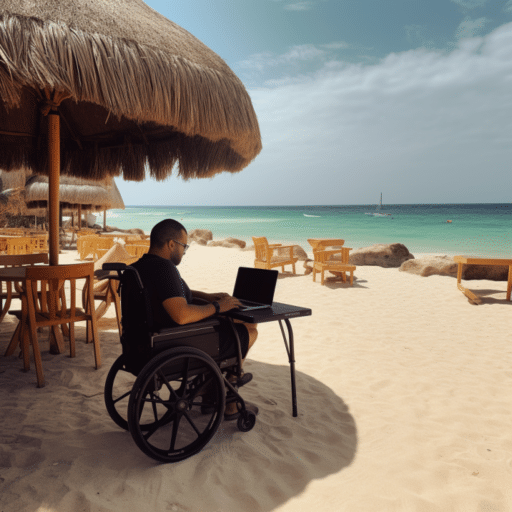As an expat, securing expat disability insurance is a crucial step in protecting yourself and your financial future. Whether you’re living abroad temporarily or have made it your permanent home, unexpected disabilities can have a significant impact on your ability to earn an income.
In this comprehensive guide, we will walk you through the ins and outs of expat disability insurance to help you make informed decisions and ensure your financial security.
If you have any questions or want to invest or get insured as an expat or high-net-worth individual, you can email me (advice@adamfayed.com) or use these contact options.
What is Expat Disability Insurance?
Expat disability insurance is a specialized form of insurance that provides financial protection to expatriates in the event they become disabled and are unable to work.
Unlike disability benefits offered by some countries, which often come with limitations or may not cover the full extent of an individual’s needs, expat disability insurance is designed to address the unique challenges and risks faced by those living abroad.
Short-term disability insurance typically covers disabilities that last for a few months to a year, while long-term disability insurance provides coverage for disabilities that extend beyond a year.
Both types of coverage are crucial for expats as they protect against a wide range of unforeseen circumstances, including accidents, illnesses, and chronic conditions that might affect their ability to work.
Expatriates face distinct risks due to factors such as living in unfamiliar environments, variations in healthcare systems, and potential difficulties in accessing social security benefits or government assistance.
By obtaining expat disability insurance, individuals can safeguard themselves against potential income loss and ensure they have the necessary financial resources to maintain their quality of life.
Assessing Your Disability Insurance Needs as an Expat
Before diving into the world of expat disability insurance, it is imperative to assess your specific needs based on your unique circumstances.
Start by evaluating your lifestyle, occupation, and financial obligations. Consider the potential risks associated with living abroad, such as differences in healthcare systems, work environments, or accident-prone locations.
Age, health status, and the duration of your stay abroad are essential factors to consider when determining the type of coverage you require and the premiums you’ll pay.
For example, older individuals may have different needs and risk factors compared to younger expats. It’s important to assess the likelihood of disability based on factors such as your occupation and the prevalence of certain medical conditions in the country of residence.
Conducting a thorough evaluation of your disability insurance needs can accurately determine the appropriate coverage amount and policy features that align with your specific situation.
This proactive approach ensures that you are adequately protected and prepared for any unexpected events that may arise during your time as an expatriate.

Factors Influencing Expat Disability Insurance
Several factors can influence the selection and cost of expat disability insurance. Considering these factors will help you navigate the selection process and find the most suitable expat disability insurance policy that aligns with your needs and budget.
Age
Age plays a significant role in determining the premium rates of expat disability insurance. Generally, the older an individual is, the higher the premium will be due to the increased likelihood of developing disabilities or health conditions. Insurance providers consider age as a risk factor and adjust the premium accordingly.
Occupation
Occupation also plays a vital role in assessing disability insurance needs. Certain occupations may have higher risks of disability, such as physically demanding jobs or those with a higher likelihood of accidents or injuries. Additionally, some professions may have specific requirements or limitations when it comes to disability coverage.
Health Status
Health status is another crucial factor considered by insurance providers. Pre-existing health conditions may impact coverage terms, premiums, or even the eligibility for disability insurance. Providers may request medical evaluations or review medical records to assess the applicant’s health status and determine the level of risk involved.
Duration of Stay
The duration of your stay abroad is an important consideration as well. If you plan to live abroad temporarily, you may need short-term disability coverage. However, if your relocation is long-term or permanent, long-term disability coverage becomes essential to provide ongoing financial protection.
Country of Residence
Country or region of residence can affect the availability and cost of disability insurance. Factors such as the local healthcare system, safety standards, and overall risk environment may influence the underwriting process and coverage options. Some regions with higher risks may have limited coverage options or higher premiums due to increased chances of accidents or injuries.
Comparing Expat Disability Insurance Providers
When it comes to securing the right expat disability insurance provider, thorough research and comparison are essential.
Not all providers offer the same level of coverage, so it’s crucial to assess their specialization in providing insurance for expatriates. Follow these steps to make an informed decision:
Assess Reputation and Reliability
Start by looking for reputable insurers that have a track record of delivering reliable coverage and excellent customer service. Seek out insurance companies with a strong presence in the international insurance market and positive reviews from expatriate clients. Consider their financial stability and their ability to honor claims promptly.
Evaluate Policy Features and Terms
Examine the policy features, terms, and conditions of each potential provider. Focus on understanding the coverage duration and waiting periods. Some policies may require a waiting period before benefits become effective, so it’s crucial to consider the length of this waiting period and ensure it aligns with your needs.
Additionally, review any exclusions or limitations that may apply to the policy. Exclusions can vary, so it’s important to understand what specific scenarios or conditions may not be covered. For example, certain high-risk activities or pre-existing medical conditions might be excluded.
Understand Premium Structure and Costs
Carefully evaluate the premium structure, deductibles, and co-pays associated with each policy. Premiums can vary significantly based on factors such as age, occupation, health status, and coverage amount.
Determine if the premiums are fixed or if they may increase over time.
Consider the deductibles and co-pays as well, as these are the amounts you would be responsible for paying out of pocket in the event of a claim.
A lower deductible may result in higher premiums, while a higher deductible can lower your premiums but increase your out-of-pocket expenses if you need to make a claim.
Seek Professional Advice
Navigating the complexities of expat disability insurance can be challenging. Consider consulting with a financial advisor or insurance professional who specializes in insurance for expatriates.
They can provide personalized guidance based on your specific circumstances, help you compare different providers, and assist in selecting the most suitable policy for your needs.

Expanding Coverage: Supplementing Employer-Sponsored Plans
While many expatriates receive disability coverage through their employers, it’s important to assess the adequacy of this coverage.
Employer-sponsored plans may have limitations or exclusions that leave gaps in your protection. To ensure comprehensive coverage, explore additional options to supplement your employer’s plan:
Individual Disability Insurance Policies
Consider obtaining an individual disability insurance policy tailored to your needs. These policies provide an additional layer of protection and can be customized to fit your unique situation as an expatriate. With an individual policy, you have more control over the coverage amount, policy features, and terms.
Individual policies often offer more flexibility than employer-sponsored plans, allowing you to tailor the coverage to your specific needs. They may also offer more comprehensive benefits, including coverage for disabilities resulting from accidents or specific medical conditions.
When researching individual policies, ensure they provide coverage for both short-term and long-term disabilities, as well as any specific risks you may face as an expatriate.
Riders and Endorsements
To address specific needs or risks, consider adding riders or endorsements to your disability insurance policy.
These additional provisions can extend the coverage of your policy, offering protection beyond the standard policy terms. For example, you may be able to add a rider that covers disabilities resulting from high-risk activities, such as extreme sports or adventure travel.
Alternatively, you may want to consider adding a rider that covers disabilities resulting from specific medical conditions, such as cancer or cardiovascular diseases. These riders provide added peace of mind, knowing that you are protected in situations that may be of particular concern to you.
Group Disability Insurance through Professional Associations
Another option to supplement your employer’s plan is to explore group disability insurance offered through professional associations.
Some associations offer group insurance plans specifically designed for their members, including expatriates. These plans can provide access to competitive rates and comprehensive coverage options.
Research professional associations in your industry or field of work to identify if they offer group disability insurance. Assess the terms and conditions of the group plan, including coverage limits, waiting periods, and any exclusions or limitations that may apply.
Joining a professional association and taking advantage of their group insurance can provide added protection and peace of mind as an expatriate.
Application Process for Expat Disability Insurance
When applying for expat disability insurance, it’s essential to be well-prepared and navigate the application process effectively. Follow these steps to ensure a smooth and successful application:
Step 1: Gather Required Documentation and Information
Start by collecting all the necessary documentation and information needed for the application. This typically includes:
- Medical history: Provide detailed information about your medical conditions, previous illnesses, surgeries, and any ongoing treatments.
- Proof of income: Submit documentation that demonstrates your income level and earning capacity, such as tax returns, pay stubs, or employment contracts.
- Personal identification: Prepare copies of your passport, visa, or any other identification documents required by the insurance provider.
- Additional documents: Depending on the insurer’s requirements, you may need to provide supplementary documents such as medical reports or employer verification.
Step 2: Complete Forms Thoroughly and Accurately
Take your time to complete all the forms provided by the insurance provider carefully. Ensure accuracy and provide truthful information. Mistakes or omissions could lead to delays or potential issues during the underwriting process.
Step 3: Submit Promptly and Keep Copies
Once you have completed the forms and gathered all the necessary documentation, submit your application promptly. Ensure you keep copies of all submitted materials for your records. This will be valuable for reference in case of any discrepancies or future inquiries.
Step 4: Consult with a Financial Advisor or Insurance Professional
Consider seeking guidance from a financial advisor or insurance professional who specializes in expat disability insurance. They can assist you throughout the application process, helping you understand the terms and conditions, answering any questions you may have, and providing valuable insights based on their expertise.
Claiming Process for Expat Disability Insurance
In the unfortunate event that you become disabled and need to file a claim, it’s essential to understand the claims process for your expat disability insurance policy. Here are the key steps to navigate the claims process successfully:
Step 1: Understand the Documentation Requirements
Familiarize yourself with the specific documentation required by your insurance provider to support your claim. This typically includes:
- Disability claim form: Complete the form provided by the insurer, providing accurate and detailed information about your disability and its impact on your ability to work.
- Medical evidence: Gather medical reports, test results, and any other documentation that substantiates your disability and supports your inability to work.
- Attending physician statement: Request your healthcare provider to complete a form or write a statement detailing your medical condition and the resulting disability.
Step 2: Adhere to Time Limits
Be aware of any time limits specified in your policy for filing a disability claim. Adhering to these deadlines is crucial to ensure your claim is considered valid. Failure to submit your claim within the specified time frame may result in a denial of benefits.
Step 3: Communicate Proactively with Your Insurance Provider
Maintain proactive communication with your insurance provider throughout the claims process. Notify them promptly of your disability and initiate the claims procedure as soon as possible. Respond to any requests for additional information or documentation in a timely manner to avoid unnecessary delays.
Step 4: Keep Copies of Correspondence and Documentation
Create a file to organize and store all correspondence, claim forms, and supporting documents related to your disability claim. Keeping meticulous records will help you stay organized and have evidence of your interactions with the insurance provider.
Step 5: Address Challenges or Issues Promptly
If you encounter any challenges or issues during the claims process, such as a denial of benefits or disagreements over coverage, address them promptly.
Engage in open and transparent communication with your insurance provider, providing any additional information or clarifications they may require. If necessary, seek assistance from a legal professional or insurance advocate who can guide you through the resolution process.

Maintaining Your Expat Disability Insurance Coverage
Once you have obtained expat disability insurance, it is crucial to maintain your coverage over time. Life is full of changes, and as an expatriate, you may experience various milestones or shifts in circumstances that can impact your insurance needs.
To ensure that your disability insurance continues to adequately protect you and your loved ones, it’s important to regularly review and update your coverage. Here’s how you can maintain your expat disability insurance effectively:
Regularly Assess Your Coverage Needs
Periodically reassessing your coverage needs is essential to ensure that your policy aligns with your current situation. Life changes such as getting married, having children, or even changes in employment can significantly impact your insurance requirements.
For example, if you start a family, you may need to increase the coverage amount to account for additional financial responsibilities. On the other hand, if you retire or transition to a different occupation, you might need to adjust your policy accordingly.
Review Policy Terms and Conditions
As you review your expat disability insurance, carefully examine the terms and conditions of your policy. Pay attention to the coverage duration, waiting periods, and any specific exclusions or limitations that may apply.
Understanding the details of your policy ensures that you are aware of the benefits and limitations it offers. If you have any questions or concerns about your policy, reach out to your insurance provider or financial advisor for clarification.
Stay Informed About Changes in Insurance Regulations
Insurance regulations and requirements can change over time, both in your home country and the country where you reside as an expatriate. It is important to stay informed about any regulatory updates that may affect your expat disability insurance coverage.
Changes in regulations could impact your eligibility for benefits or the terms of your policy. Keep abreast of such developments by regularly reviewing official government sources or consulting with local insurance experts.
Communicate with Your Insurance Provider or Financial Advisor
Maintaining open lines of communication with your insurance provider or financial advisor is crucial in keeping your expat disability insurance up to date.
Schedule periodic policy reviews with your provider to discuss any changes in your situation and assess the continued suitability of your coverage. During these reviews, you can explore potential adjustments to your policy and ensure that it adequately meets your evolving needs.
Your insurance provider or financial advisor can offer guidance, answer questions, and provide recommendations based on their expertise.
Keep Important Documents Organized
Throughout the life of your expat disability insurance policy, it is essential to keep all important documents organized and easily accessible.
Maintain copies of your policy contracts, premium payment receipts, and any correspondence with your insurance provider.
This documentation will be valuable in case you need to reference it in the future, such as during the claims process or policy reviews.
Be Proactive and Take Action
Maintaining your expat disability insurance coverage requires proactive effort. Stay informed about changes in your circumstances, insurance regulations, and industry trends.
Regularly review your policy, assess your coverage needs, and take action accordingly. If you identify any gaps or deficiencies in your coverage, don’t hesitate to make the necessary modifications or explore additional insurance options.
Conclusion
Securing expat disability insurance is a vital step for any expatriate looking to protect their financial future. Understanding the nuances of expat disability insurance and assessing your specific needs can make informed decisions and choose the right coverage.
Conduct thorough research, compare providers, and familiarize yourself with the terminology used in disability insurance policies. Supplement your employer’s coverage if necessary, navigate the application process diligently, and be prepared for the claims process.
Finally, regularly review and update your coverage to adapt to changing circumstances. Taking these steps can help safeguard your financial well-being and help you enjoy peace of mind as an expat.
Pained by financial indecision?

Adam is an internationally recognised author on financial matters with over 830million answer views on Quora, a widely sold book on Amazon, and a contributor on Forbes.




I am diagnosed with a mental disability. I receive disability from the government in the country I am now living. I have been an expat going on 10 years. I know for a fact that I qualify in the US (where I am a native natural born citizen). I have dozens of letters from doctors over many years. But, SS told me on the phone they cannot let me apply because I do not have a US address. I know for sure, without question, this is nonsense. Any thoughts. I’d gladly pay a contingency fee percentage to get that which I am entitled.
Getting disability insurance once you already have a condition is tough, as it is already a pre-existing condition. I would try to speak to the US insurer.